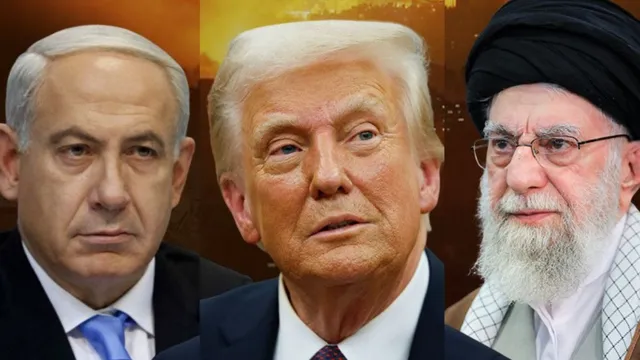- By Supratik Das
- Mon, 30 Jun 2025 09:18 AM (IST)
- Source:JND
Iran's senior Shia cleric, Grand Ayatollah Naser Makarem Shirazi, issued a fatwa, a religious edict against the US President Donald Trump and Israeli Prime Minister Benjamin Netanyahu, labeling them as "enemies of God" and calling upon Muslims across the world to come together and fight against them. In his decision, Ayatollah Makarem declared that any individual or regime posing a danger to the leadership of the Islamic Republic or its top religious leaders is considered a mohareb, an individual who fights against God.
According to Iranian law, a mohareb can be severely punished, such as through execution or exile. "Any cooperation or assistance to these enemies from Muslims or Islamic states is haram (forbidden)," Makarem told Iran's Mehr News Agency. Makarem's fatwa called for all the world's Muslims to make these enemies regret their mistakes and words. Any Muslim who experiences loss or difficulty in this campaign, he said, "will be rewarded as a fighter in the way of God." Under Iran's Islamic Penal Code, a convicted mohareb can be executed, crucified, have a hand and foot amputated, or be exiled.
Not The First Fatwa Targeting Individuals
The controversial fatwa comes after a fierce 12-day battle that began on June 13, when Israel launched air raids on Iranian military and nuclear facilities, killing senior commanders and nuclear experts. Iran launched ballistic missile strikes against Israeli cities in retaliation. Amid increased tensions, the United States allied with Israeli troops and bombed three of Iran's nuclear sites, leading Iran to retaliate against an American military facility in Qatar.
This is not the first violent religious edict issued by an Iranian cleric. Iran's Supreme Leader, Ayatollah Khamenei, in 1989, had decreed a fatwa for the assassination of author Salman Rushdie for his book The Satanic Verses. Rushdie narrowly escaped several attempts on his life, including a near-fatal stabbing in New York in 2023. This legal order not only targeted Rushdie but also anyone associated with the book, leading a radical organization, the 15 Khordad Foundation, to offer a reward for Rushdie's assassination. The fatwa sparked widespread protests across various countries, resulting in violence and casualties, while triggering a global debate about freedom of expression and the limits of artistic license. Despite Khomeini's death in 1989 and the subsequent Iranian government's efforts to distance itself from the fatwa, the decree remained a contentious issue, with supporters arguing it could only be rescinded by Khomeini himself. The situation underscored the tension between Western liberal values and Islamist calls for ideological conformity, symbolizing a broader cultural divide. Over the years, Rushdie's plight galvanized support from writers, public figures, and organizations advocating for literary freedom, highlighting the enduring conflict between individual rights and collective beliefs in an increasingly polarized world.
After the most recent strikes, US and Israel have threatened Iran with advancing its uranium enrichment to weapons grade, which Tehran has consistently denied. Trump has threatened further military action if Iran continues its nuclear programme. Israeli PM Netanyahu said the strikes on Iran’s nuclear sites would “change history”. The situation remains tense as diplomatic channels struggle to contain the growing crisis in the Middle East.

